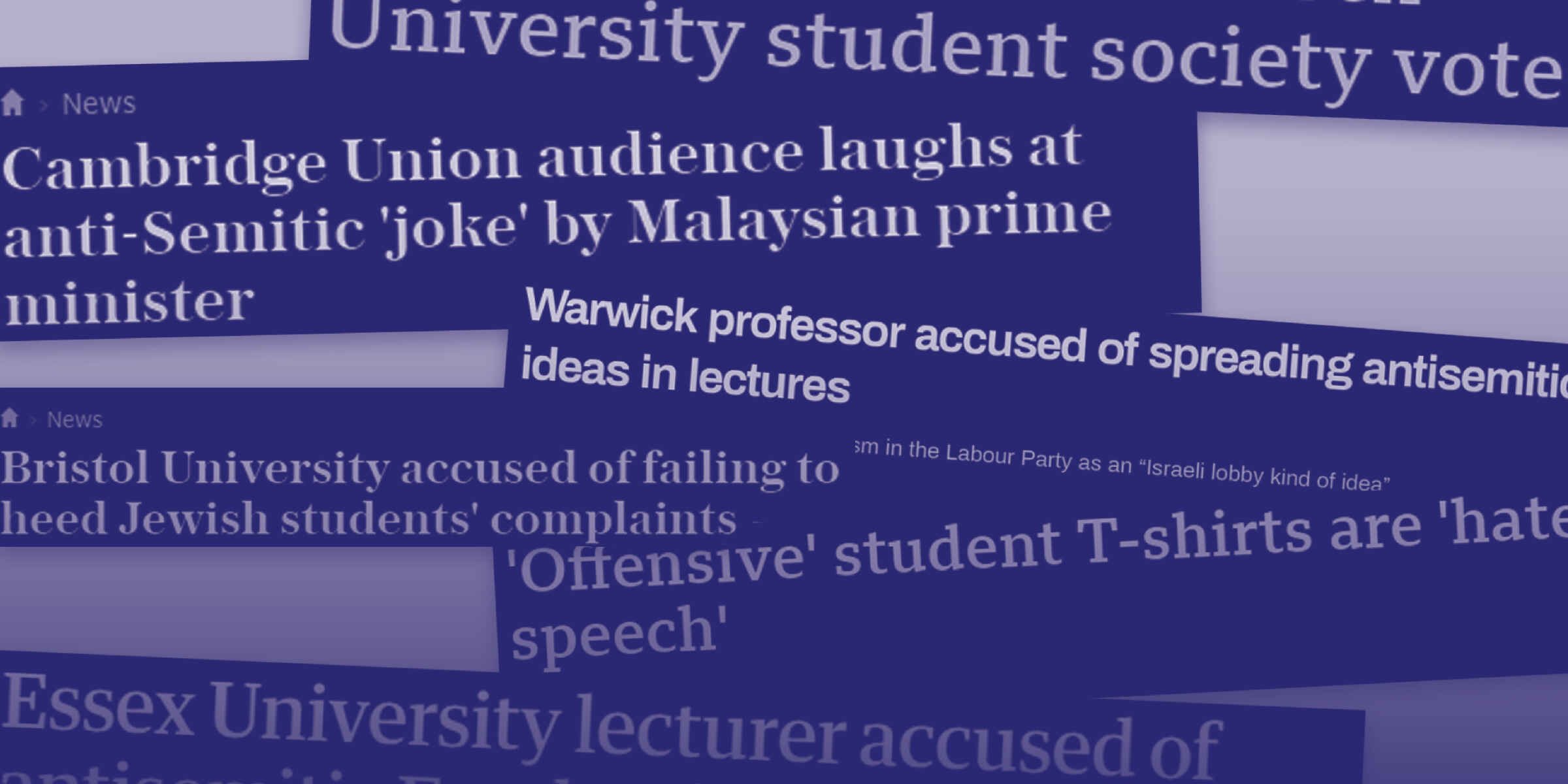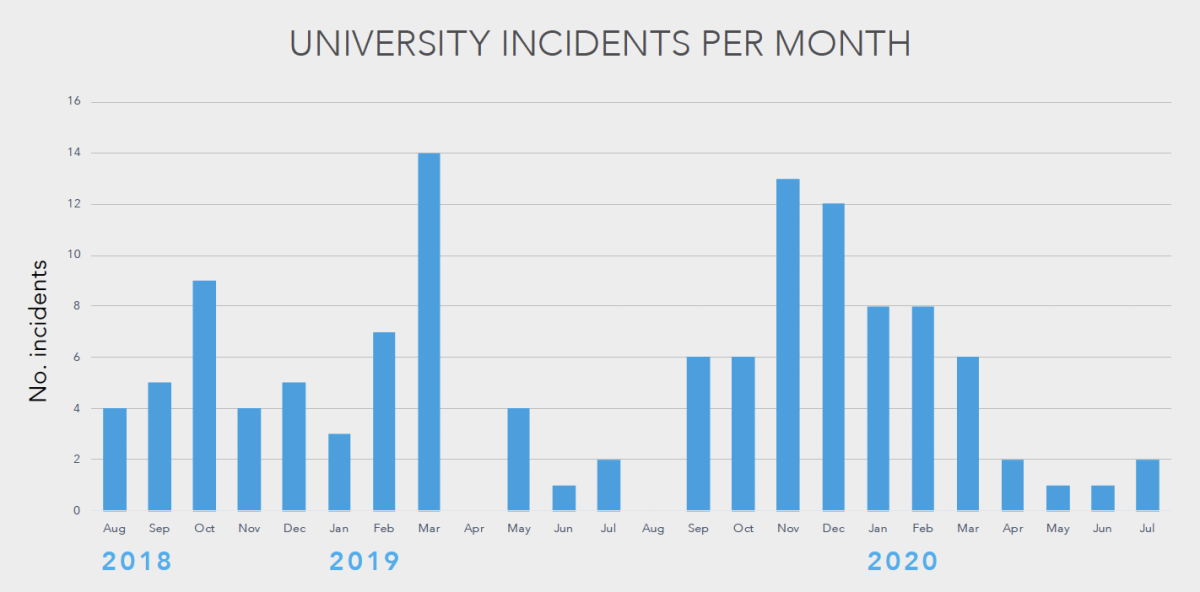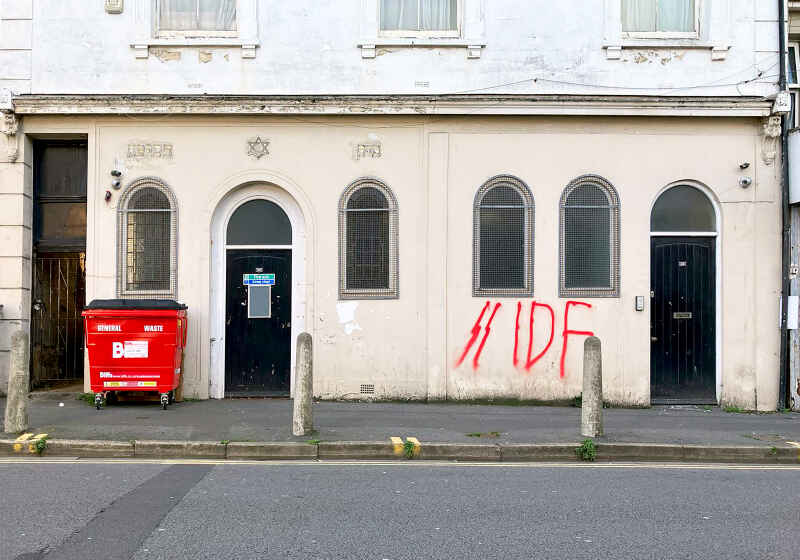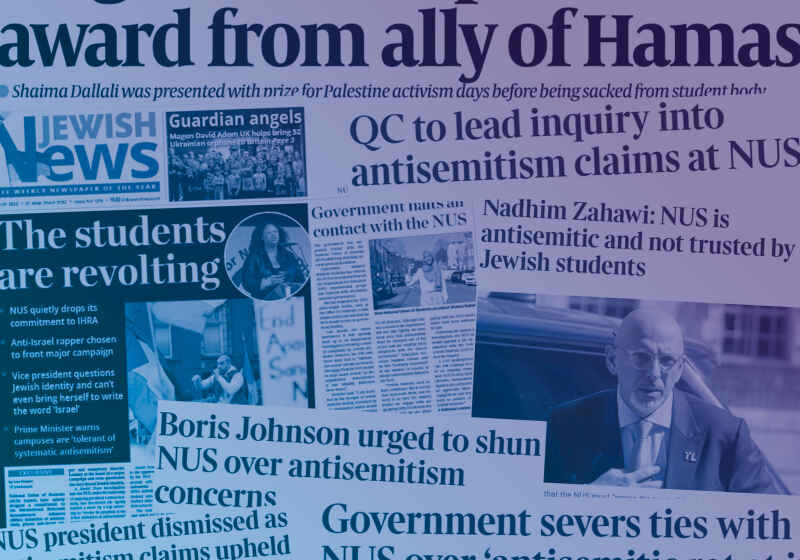CST Blog
Campus Antisemitism in Britain 2018-2020
17 December 2020

A new investigation by CST, published today in a report titled Campus Antisemitism in Britain 2018-2020, has found 123 antisemitic incidents affecting Jewish students, academics and student bodies in 34 different towns and cities across the UK during the past two academic years.
The vast majority of Jewish students have a strongly positive experience at university, and there are thriving Jewish student communities across the country. However, antisemitism does affect Jewish students and academics on a regular basis.
This new report uncovers a much higher number of antisemitic incidents on UK campuses than had previously been reported. It shows that in some instances, university staff, academics and students’ union officers were themselves responsible for antisemitism on campus, and that university complaints processes are sometimes inadequate. In one case reported to CST, a Jewish student at the University of Warwick was even subjected to disciplinary investigation after he complained that a member of academic staff had made an antisemitic comment in a lecture. This was later dropped with no action taken against the student.
CST has produced this report to highlight these problems and to encourage Jewish students to report and challenge antisemitism where it exists. In particular, universities need to establish appropriate procedures to deal with this type of discrimination within their institutions.
University antisemitic incidents: the numbers

- CST recorded a total of 58 university incidents in the 2018/2019 academic year and 65 university incidents in the 2019/2020 academic year, making a total of 123 antisemitic incidents during the two years covered by this report. The total for 2019/2020 is the highest total CST has ever recorded in a single academic year, despite the year being cut short as a result of the COVID-19 pandemic. Previously, CST had recorded university incidents by calendar year, and logged 25 such incidents in 2018; 22 in 2017 and 41 in 2016.
- The significant increase in these figures in comparison to previously reported numbers reflect a sustained reporting drive by CST’s campus team to encourage students to report antisemitic incidents to CST.
- University incidents are defined as any antisemitic incident reported to CST that involves students, staff, student bodies or academics at a UK university. These include incidents that take place on-campus, and incidents that take place off-campus but where the incident relates to the victim’s student, academic or staff status. It also includes online incidents that fit this description.
- Thirty-nine university antisemitic incidents took place on-campus, 33 took place off-campus and 51 were online. The vast majority of online incidents were in the Abusive Behaviour category, while three were categorised as Threats.
- CST recorded four instances of Assault, two of which were in the 2018/2019 academic year and two in the 2019/2020 academic year. There were seven university incidents recorded in the category of Damage and Desecration to Jewish property.Five Threats took place in the 2018/2019 and 2019/2020 academic years, three of which were online and two of which took place off-campus. Eighty-Seven per cent of the antisemitic incidents recorded by CST during this two-year period were in the Abusive Behaviour category, totalling 107 incidents. There were no recorded university incidents of Extreme Violence or mass-mailed antisemitic Literature in this period.
- CST recorded 14 university antisemitic incidents perpetrated by staff, including four at the University of Warwick, two at the University of Leeds and two at the University of Nottingham. Incidents perpetrated by members of staff can often involve a strong power imbalance between victim and perpetrator, if a Jewish student needs to complain about an academic who is in a position of direct authority over them, or if they are expected to report concerns to the same institution they are complaining about.
- Throughout the two academic years covered in this report, CST recorded 10 antisemitic incidents perpetrated by students’ union officers or student societies. This refers to incidents where the alleged perpetrators were elected officers or staff in a university’s students’ union; or were National Union of Students (NUS) full time, part time or voluntary officers. This also includes antisemitic incidents perpetrated by students’ union-affiliated clubs or societies, such as incidents perpetrated by members of a society or club’s executive committee in their capacity as an executive committee member, or antisemitic events organised by a students’ union-affiliated club or society.
- The six cities with five or more recorded incidents throughout this period were Coventry (14 incidents, 13 of which took place at the University of Warwick), Birmingham (13), Leeds (11), Nottingham (nine), Bristol (seven) and Leicester (five). With the exception of Coventry and Leicester, these cities represent the locations with the largest Jewish student populations, and therefore follow the national trend towards more incidents in areas with larger Jewish populations.
- The highest monthly totals of university incidents recorded by CST in these two academic years were March 2019, when CST recorded 14 university incidents; November 2019, with 13 incidents; and December 2019, with 12 incidents. The 14 incidents in March 2019 took place in 12 different universities and were mostly online.
- CST recorded 15 cases in which an organisation or speaker who had been associated with antisemitic remarks was invited to speak on campus. These events do not fit CST’s strict definition of an antisemitic incident, and therefore are not included in the overall total of 123 antisemitic incidents in this report.
University complaints procedures
There is a wide variety of responses to student complaints about antisemitism across different Higher Education institutions, some of which highlight serious flaws in some universities’ complaints procedures: both the procedures themselves, and their application. CST’s full report Campus Antisemitism in Britain 2018-2020 provides detailed case studies of three different responses to complaints about antisemitism from three universities: one positive example, from the University of Essex, and two case studies of poor responses from the University of Warwick and the University of Bristol where Jewish students felt let down by their institutions. Two of these case studies are summarised here. In the case of the University of Warwick, the President of the Jewish Israeli Society was even subjected to a disciplinary investigation by the University after he had made a complaint of antisemitism against an academic member of staff.
Example of good practice: the University of Essex
In February 2019, the University of Essex’s students’ union held a vote on whether a Jewish Society should be created, and over 200 students voted “No”. During the campaigning period for this vote it emerged that a member of academic staff had encouraged students to vote against the creation of the society, and had posted other antisemitic conspiracy content online.
The University of Essex intervened to ensure that the Jewish Society was created, and suspended (and later dismissed) the academic who had backed the campaign against its creation. In addition to this, the University of Essex engaged extensively with the Jewish community following this incident, including with Jewish communal organisations such as CST. As well as ensuring that a Jewish Society was created at the university, they conducted a review into the experiences of Jewish students and staff, and held a public event in support of the Jewish community.
Example of bad practice: the University of Warwick
In November 2019, the President of the University of Warwick’s Jewish Israeli Society submitted a complaint on behalf of a society member who felt that an academic had made an antisemitic comment during a lecture, and who wanted to remain anonymous. When the lecturer found out about the complaint, she emailed her whole class, denying that she had said anything antisemitic and pointing out that no complaints were raised during the lecture. In doing so she risked undermining the complainant’s desire for anonymity and ignored the fact that many students may be reluctant to directly accuse their lecturer, who is in a position of power and authority over them, of making an antisemitic remark; and may be especially reluctant to do so in front of a lecture hall full of people.
When asked for comment by Jewish News, the University of Warwick repeated the essential parts of the academic’s defence despite the investigation having not yet taken place. The university proceeded to investigate the complaint and ruled that the comment “was interpreted as an anti-Semitic conspiratorial trope” but nevertheless was legitimate “within the principles and values of tolerance and freedom of speech”.
However, this was not the end of the matter. The Jewish Israeli Society President (who had submitted the complaint on behalf of the Jewish student who wished to remain anonymous) was then himself the subject of a disciplinary complaint that related directly to his role in the complaint against the lecturer. After a three-month investigation, all the disciplinary charges against the society President were dropped and no action was taken.
Recommendations for universities
As evidenced by the case studies above, it is essential that universities have the procedures in place to handle reports of antisemitic incidents appropriately, including:
- Third party reporting: Reporting hate crime can be an intimidating and stressful experience. During the past two years CST has seen instances where students swiftly reported antisemitism to CST but were hesitant to submit a complaint to their university. By allowing third party organisations such as CST or UJS to submit complaints regarding antisemitism on behalf of students, universities could significantly enhance the tackling of discrimination in their institutions. This is common practice in the hate crime field and would be greatly beneficial in the university context.
- Appropriate definition: Having an adequate and accepted definition of antisemitism is vital to successfully tackling campus antisemitism. On too many occasions, universities have failed to recognise the existence of discrimination in their bodies due to relying on inappropriate and incomplete definitions. By adopting the International Holocaust Remembrance Alliance definition of antisemitism, universities can ensure that there is a common, accepted standard with which to measure antisemitism and assess complaints.
- Timing of complaints: Universities should have an adequate and reasonable time frame in which they respond to and resolve complaints. When complaints are dragged out over many months, they can easily extend into examination periods and may affect students’ academic performance. They may even extend past students’ graduation, limiting students’ ability to actively engage in the process and preventing them from receiving appropriate closure before they leave campus life. Universities should also be willing to accept and investigate historical complaints, as many students want to wait until they have completed their studies before making a complaint to avoid the risk of any negative consequences during their time at university.
- The burden of proof: Some universities have imposed unfair requirements on Jewish students to provide all the evidence to support their complaint, resulting in victims being discouraged from reporting antisemitism to the university. This is particularly the case when it comes to antisemitic comments made in lectures or in talks. Institutions need to ensure that, where appropriate, they put measures in place to obtain the necessary evidence themselves to investigate Jewish students’ claims, such as lecture recordings for modules where students claim to have experienced antisemitism from an academic, or moderation and recording for events involving problematic speakers.
- Ensuring impartiality: Universities should develop an independent process for complaints of discrimination, bigotry or hateful language to be assessed by staff who do not have any personal relationship with the academics or students involved in each case, perhaps involving external advisers who have specialist expertise in the type of discrimination or bigotry being alleged.
If you are a Jewish student who has witnessed or experienced antisemitism, it is essential that you report it. You can do so by emailing [email protected], or filling out the form on the CST website at cst.org.uk/report-incident.
CST and UJS have strong expertise and a dedicated team focused on helping and supporting you, and we can help you report antisemitism whether it is to your university, students’ union or to the police.
Please get in touch and let us help you fight antisemitism on your campus.


